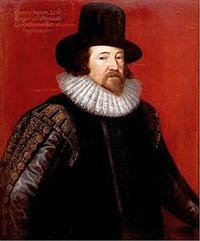
| Born: Jan 22, 1561 in Strand, London, England |
| Died: Apr 9, 1626 (at age 65) in Highgate, London, England |
| Nationality: English |
| Fields: Renaissance Philosophy, Empiricism |
| Famous For: Advocate of the scientific method during the scientific revolution |
Francis Bacon (1561-1626) was an English philosopher, essayist, and statesman. He is famous for being an advocate and a defender of the science revolution. His works on philosophy formulated a very complex scientific methodology and this is known as the Baconian method.
Bacon’s Early Years
Bacon was born in London in January of 1561, and his father was Sir Nicholas Bacon. His mother, Anne, was the daughter of Anthony Cooke, a noted humanist. Most historians believe that he was educated at home during his early years because of his ill health. When he was 12, he entered Trinity College in Cambridge. His education was mostly conducted in Latin which was common during this period of time.
In 1576, he went abroad and visited several countries with Sir Amias Paulet, an English ambassador. He spent time in France where the government and society offered him valuable political training. Over the next three years, Bacon visited Poitiers, Blois, Tours, Spain and Italy. Throughout his travels, he studied different languages, civil law, and statesmanship while undertaking routine diplomatic responsibilities.
Counsel and Statesman
Bacon’s father died suddenly in February of 1579 and he then returned to England. His father had planned to set aside a substantial amount of money to acquire an estate for him, but he passed away before doing so. Bacon only received about a fifth of that amount. To support himself in the future, Bacon became a resident at one of the Inns of Court, Gray’s Inn. In 1582, he became a barrister.
Even though his law career was very successful, Bacon had many other philosophical and political ambitions. He entered politics in 1584 and was part of Parliament for many years. He experienced a setback while in office because he objected to the large costs of the war with Spain which displeased the Queen of England.
In 1591, he became friends with the Earl of Essex. Essex recommended him for many high offices which he did not attain. The friendship ended tragically when Essex attempted a coup d’etat, and because of this he was executed in 1604. The next year, Bacon married Alice Barnham, an alderman’s daughter.
Bacon’s Philosophy
Bacon clearly separated religion and philosophy, but he did believe the two could coexist. He thought philosophy was based upon reason and that faith was based upon on revelation, which was irrational. He addressed this issue in his De augmentis Scientiarum work.
He did not offer an actual philosophy. Instead he proposed a method for developing philosophy. Bacon wrote that philosophy employed the deductive syllogism in order to interpret nature. He believed the philosopher should move forward through inductive thinking from facts to axioms to laws. Before starting this induction, one’s mind is to be free from specific false concepts or inclinations which may distort the truth.
He called these things which can distort the truth Idols, or idola, and he classified four different kinds: idola tribus, or Idols of the Tribe (typical to the race), idola specus, or Idols of the Den (specific to an individual), idola fori, or Idols of the Marketplace (from the improper use of language) and idola theatric, or Idols of the Theater (caused by a misuse of authority). The conclusion of induction is the detection of forms, the different ways where natural phenomena occur, and the causes by which they proceed.
Honor and Disgrace
In 1603, Francis Bacon was knighted. In 1620, he presented the Novum Organum (a method for obtaining natural knowledge), to King James I. This work was the most important section of the Instauratio Magna, a work which was never completed. In 1621, he was appointed the Viscount St. Alban. The appointment did not last long because he was soon arrested for accepting bribes.
Bacon’s case went to trial and he was found guilty. As a result of his guilty verdict, Bacon’s offices were removed from him, he was fined, and he received a sentence. He was expatriated from the parliament and also exiled from the court. His sentence was not enforced, and the King virtually remitted his fine.
He retired and devoted the rest of his life to literary work and study. In April of 1626, he conducted a scientific experiment on chickens to see how long it could be preserved by stuffing snow inside it. This experiment led to him contracting pneumonia and he died a few days later without any heirs.